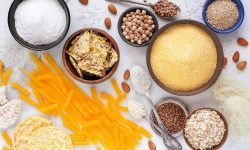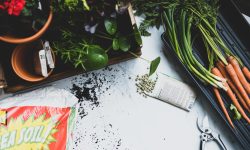Favourite Gluten-Free Items Available at Spud May National Celiac Awareness Month, but every day Spud…
For many of us, holiday meals are summed up by one thing – a golden, crispy-skinned, roasted-to-perfection turkey. The roast turkey has become symbolic of the holiday dinner, but how much do we really know about where these turkeys come from? When we see frozen turkeys in the supermarket, chances are we’re envisioning the delicious meal it will become, not wondering about the conditions in which it was raised. But with issues of animal cruelty making the news and more people trying to make ethical decisions about the food they eat, where that bird comes from might soon be as important as where it’s going. That’s why it’s important to know that that frozen turkey from the supermarket almost certainly comes from a factory farm. And while factory farming is the reason we have access to such cheap meat, the conditions under which this meat is produced are often highly disturbing.
Some claim that turkey farms are the cruellest of all factory farms, and while it seems somewhat pointless to argue that one horrific situation is empirically worse than another, it does seem that turkeys have it especially bad.
The Life Of A Factory Farmed Turkey
After hatching in an incubator and spending a few weeks crammed in a brooder, the turkeys are moved to a giant room with thousands other turkeys with no natural light or ventilation. Turkeys have, on average, less than three square feet of space per bird. Considering that turkeys on factory farms have been genetically engineered to grow much faster and bigger than ever before, this is a tiny amount of space. In this room, lights are on constantly so the birds are kept awake and eating food laced with antibiotics around the clock. Turkeys naturally have the instinct to roost, or clutch onto something when they sleep, something they have no ability to do on the floor of a crowded room.
In the 1960s it took an average of 32 weeks for a turkey to reach slaughter size. Now it takes 13-16 weeks. Because of how heavy and how quickly they now grow, turkeys are unable to mate on their own, and often are not even able to stand. Sometimes their legs break beneath them, because their skeletons have not kept up with their massive growth. Many turkeys are trampled.
Once the turkeys have reached their slaughter size, they are transported to a slaughterhouse. In Canada, it is legal to transport turkeys for up to 36 hours without food or water – standards that are among the worst in the industrialized world. They are transported in open-air crates, exposed to the elements, which cause a high mortality rate. Because each bird is worth so little, it is still more cost-effective for the industry to use open-air crates. 20,000 turkeys per year show up already dead to Canadian slaughterhouses, and an additional 200,000 are so diseased or injured they are declared unfit for human consumption.
If all that sounds like torture, consider this – it’s all 100% legal and perfectly normal. It’s basically the best-case scenario for a factory-farmed turkey. It gets worse when you add in the farm employees kicking and beating the turkeys, as was captured on video at one of Canada’s largest turkey farms, and a supplier for Maple Leaf. That farm was convicted of animal cruelty (a first for a Canadian factory farm), and fined $5600, but it would be naive to think it was an isolated occurrence.
A More Ethical Turkey Dinner
If a turkey dinner is part of your holiday plans, don’t despair. You have a choice. At Spud, we believe in local, sustainable, delicious food, raised without cruelty. All animals deserve to have some quality of life before becoming part of dinner – this means appropriate environments, healthy feed, and freedom from abuse. That’s why we make sure all the turkeys we sell come from local farms that treat them with respect. Not only because they taste better (which they do) but because it’s the right thing to do.
In Vancouver and the lower mainland, our turkeys are from Skye Hi Farm, a family farm in the Fraser Valley. They are one of, if not the only producer in Canada that has a CFIA approved & third party audited free-range & raised without antibiotic turkey program. The turkeys are given a free-choice diet, meaning they get to eat what they want, when they are hungry, as opposed to being force-fed. We also have some turkeys from Yarrow Meadow Farm. Yarrow Meadow birds run freely in open barns, where they have access to clean drinking water and whole-grain feed. When the time comes, on-site processing eliminates the need for travel and dramatically reduces bird stress.
On Vancouver Island, turkeys are supplied by JD Farms as well as Victorian Acres Farm. Victorian Acres Farm is locally owned and operated in the heart of Dove Creek. They use the fresh air and clean waters of the Comox Valley for all their animals including free run turkeys. Sandy Todd and her family’s naturally raised free-run turkeys feed on vegetable grain free from hormones and antibiotics. JD Farms is a family-owned turkey farm in the Fraser Valley. Their turkeys are raised in spacious, well-ventilated barns with free access to fresh water and a constant supply of fresh feed.
In Edmonton and Calgary, we’re proud to sell Winter’s Turkeys. Winter’s Turkey Farm is located in Dalemead, about 30 km east of Calgary. Their turkeys are raised humanely with high consideration for their comfort, health, and well-being. They have plenty of space to range in the sunshine and fresh air. They raise free-range, certified organic and heirloom turkeys.
We’ve met these farmers and been out to these farms so you don’t have to worry about where your holiday turkey is coming from. By buying your turkey from one of these farms, you’re voting with your dollar against the factory farm system, and for a better life for all farm animals.
And if you still want to abstain from eating a turkey this holiday, we have lots of alternative suggestions for you too!

Sources/More Info:
Hybrid Turkeys Pleads Guilty to Animal Cruelty – Woodstock Sentinel-Review
The Truth About Turkey – Civil Eats
Why You Should Think Twice About Buying a Butterball Turkey
Canada’s Largest Turkey Farm Responds to Animal Abuse Allegations – The Dodo
Maple Leaf Foods ‘Disturbed’ By Supplier Turkey Farm Video – CBC




